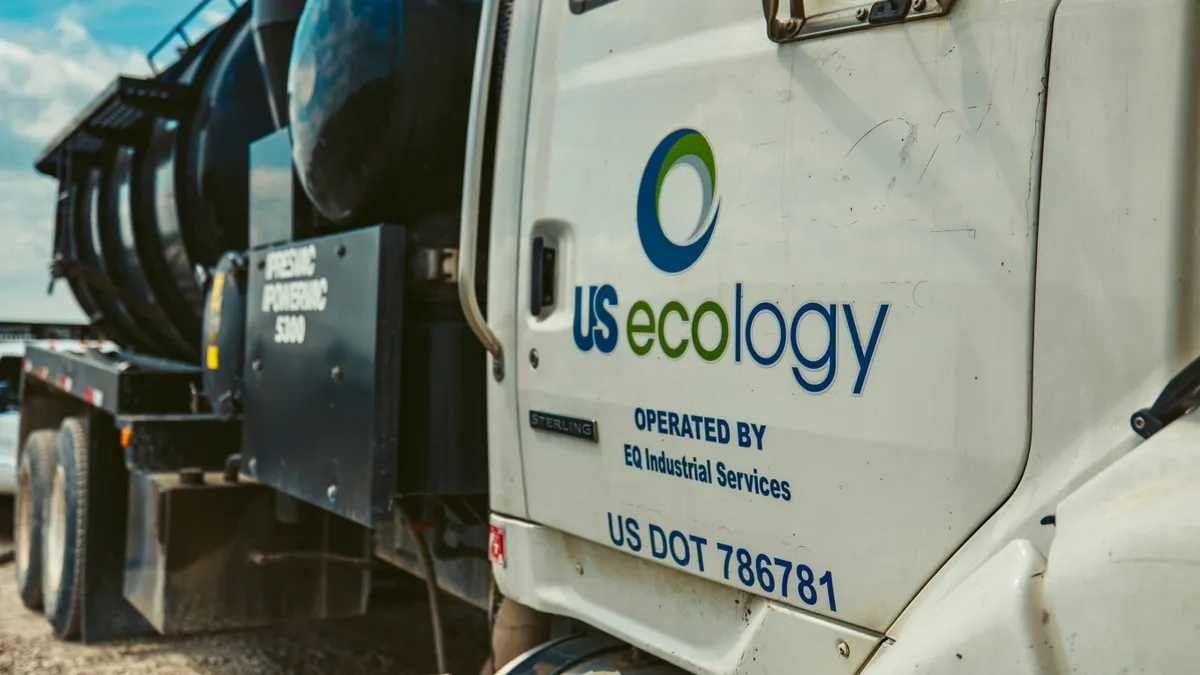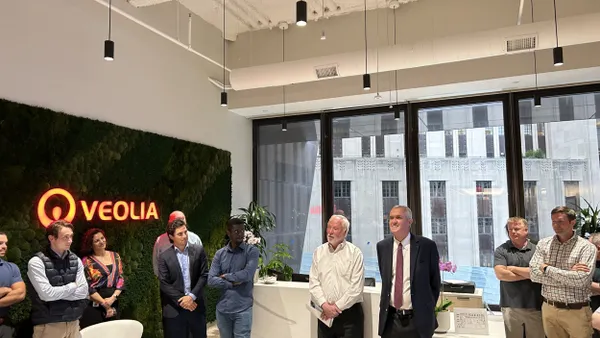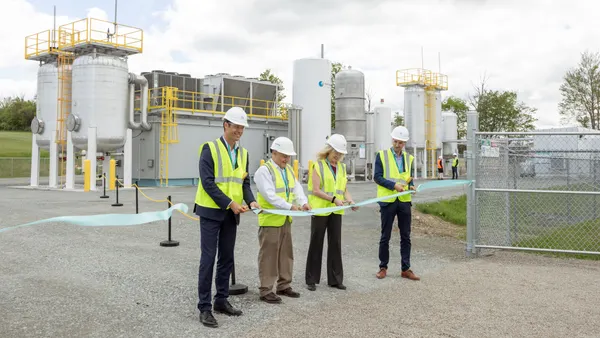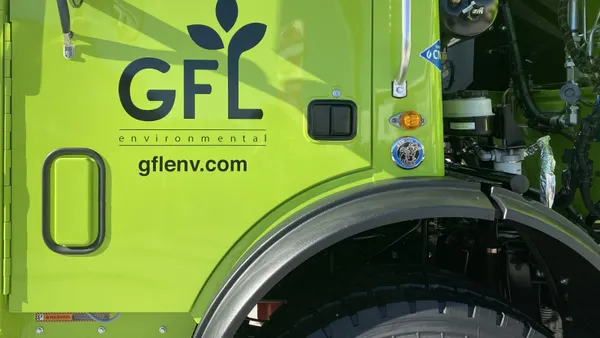Last week, Republic Services announced plans for its biggest acquisition in nearly 14 years. The pending $2.2 billion purchase of US Ecology will make Republic the top hazardous waste landfill operator in the industry.
While this part of the business isn't new for Republic — following prior acquisitions such as Tervita Corporation in 2014, Sprint Industrial Holdings in 2019 and ACV Enviro in 2021 — the new deal substantially scales up the company's environmental services platform.
Arizona-based Republic recently reported $202.5 million in revenue for its existing environmental solutions business during 2021. Idaho-based US Ecology reported $968 million in revenue for the 12-month period ending last September, following a string of its own acquisitions such as the large NRC Group purchase in 2019. Today, the company has nine specialty waste landfills (including five coveted hazardous waste sites in Idaho, Michigan, Nevada, Texas and Quebec, Canada) along with 16 transfer, storage and disposal facilities; seven wastewater treatment facilities; and over 80 environmental services field locations, including treatment and recycling centers.
Pending regulatory approval, the deal could close by the end of the second quarter and expand Republic's presence in North America as well as overseas. This week, Waste Dive spoke with Republic CEO Jon Vander Ark about what's next for the transaction, how to view this in relation to the existing solid waste business, potential opportunities around various hazardous waste streams and more.
The following interview has been edited for length and clarity.
WASTE DIVE: What's the best way to describe where this sits in the regulatory process? I imagine your filings are in with the U.S. Department of Justice and now you're waiting to hear if any divestitures will be required?
JON VANDER ARK: We started the process this week. We expect they'll go through a review, just given the size of the transaction. We expect the divestitures to be somewhere between zero and minimal on this. There's just very little overlap between the assets, based on how DOJ evaluates these transactions.
We have a great relationship with them. We go in and we give them all the information. We tell them any markets that could even potentially be considered to have some competitive effect, and obviously they do their own evaluation, but our history is we get through a more expedited process when we give them the information upfront. Any delay we expect will be just more administrative — they've been getting backed up and are still recovering from COVID and work-from-home and all the other elements. So we don't expect this to be a prolonged process at all.
Over the industry's history, in thinking about a multi-decade span, solid waste companies have sometimes had mixed results when pursuing hazardous waste expansions. What's your philosophy on why it makes sense to diversify in this way and how do you hope to differentiate yourself versus existing competitors in the space?
This all started from customers. Customers asked us to do more. Is this every one of our customers? Of course it's not. We're not trying to sell household hazardous waste services to our residential customers. This is really a billion-dollar-plus portion of our business that serves industrial manufacturing customers.
Those customers produce a number of different waste and recycling streams, and they're increasingly looking to consolidate the supply base and looking for single suppliers that can give them a full breadth of products and services. We do things methodically. We don't buy first and then figure it out later. We've worked our way through this and understood through our historic acquisitions around Tervita, back six, seven years ago, and then through Sprint a couple years ago, and ACV more recently, that customers want an integrated offering and there's cross-sell opportunities across the customer bases.
We think that US Ecology's billion-ish in revenue and our billion-plus industrial manufacturing business are terrific fits. This will give us what we think is the broadest set of products and services in the environment services space.
Another aspect in the difference between solid and hazardous waste is the elevated risk profile. How are you thinking about that as this part of the business scales up, in terms of the technical expertise of your team?
We've obviously built a strategy here over the last three or four years, and been building out the platform over the last couple of years with more pace or velocity, and have developed a perspective on everybody in the space. One of the most attractive elements of US Ecology wasn't just the post-collection assets. It's their human capital around operations, compliance and technical expertise around hazardous waste. They're world class, they've got great relationships with regulators, they have a compliance-based culture and a terrific track record. So that's also what we're acquiring and that got us comfortable that this is going to be a great fit for us, because they believe what we believe in terms of environmental responsibility.
In thinking through potential opportunities related to federal regulation, what does this mean for your approach around PFAS (per- and polyfluoroalkyl substances)? Does this give you new opportunities to be a bigger provider for treatment and disposal solutions? Can this help process leachate from your solid waste facilities at the acquired wastewater facilities?
PFAS is a hot topic in the industry. Regulators are not resolved in terms of how they're going to handle it over time, but this certainly broadens our portfolio of how to handle that. Keep in mind none of the players in the industry generated the problem, we're catching the problem. And people should be happy that we're doing that because of our environmental compliance, and making sure this doesn't leach into the soil or create issues for communities. To the extent that [regulators] find the ultimate home, their hazardous landfill infrastructure could be a terrific solution.
We have pretreatment facilities at dozens of our landfills and so we're already in that game. Adding to that toolkit not only for our own industrial water, but back to the customer solution — one of the waste streams they generate is greywater, industrial water — being able to have the waste treatment facilities as an offering there again just helps us offer a more complete solution to our customers.
Another big thing happening at the federal level is the infrastructure law. As some of the new funding for Superfund cleanups and different kinds of jobs rolls out, what does the US Ecology portfolio offer there? How can you tackle this in a bigger way than maybe you could have before?
I think it's two pieces. Their field services piece allows a lot of on-site material handling. Then in the hazardous landfill, to get back to the solution we're offering to customer, one of the things they value certainly is sustainability and all the elements of that — the environmental responsibility, the safety aspect to it, but also speed. That's where a single-solution provider who can handle all of both the field services and the material handling, and all of the waste streams coming out of that, is a very attractive solution to customers. So we will be highly competitive in those projects as that funding gets released.
On sustainability, I see US Ecology had its own goals that were relatively similar to yours in terms of greenhouse gas emissions targets and other areas. Should we expect to see Republic restate its goals? How are you thinking about integrating their own ESG performance so far into into what you're trying to accomplish?
Broadly speaking, this is a company who's got a very similar value system and culture to our own. Part of that is environmental responsibility and so we feel very good about that. They have their own goals, we'll understand those and likely modify our goals over time to incorporate that. But I'd also say that given their scale they probably weren't getting enough credit for the great work that they're doing. It takes work and effort to do the reporting, to submit the profile, to get into the ratings and rankings. I expect this to only enhance our profile.
Since their landfills aren't big greenhouse gas emitters in the way that solid waste can be, would transportation be an area with more opportunity in terms of alternative fuel vehicles?
Yeah, we'll look at that and we'll certainly look at rail as well. They have a rail infrastructure, we do as well, and that's another big source of optimization between the two companies.
Does their rail infrastructure help you at all with moving material on the solid waste side, or is it more in parallel?
We talked about the [$40 million in] cost synergies more at the operating level, but there's certainly opportunities from a material flow standpoint there. As they get these jobs, there's special waste and solid waste that comes out of those facilities on a recurring basis, or even some of the event work. That's an opportunity for us to get the material, but then also optimize the logistics and make sure we're putting that in the most efficient spot and minimizing the transportation costs.
From a geographic standpoint, this will put you in new countries and expand the portfolio in Canada. Is it a goal to build up those platforms, or is that sort of to be determined whether or not you want to be in all those areas?
Yeah, Canada is really attractive. They've got a really great facility from a legacy acquisition called Stablex in Quebec that is very core to what they do. That's one of their five hazardous landfills. They also, through their NRC acquisition, acquired a smaller footprint in the UK and Turkey and parts of Europe. That's something that we'll put under — like all parts of the business, but specifically there — a strategic review and just understand the connectivity. If that's integral to serving customers and part of global contracts and other things we'll be interested in that. But if that's more standalone, we'll also have a very open mind that somebody else could be the more natural owner of that.
Could this lead to you start competing for solid waste acquisitions in Canada?
We're already in Canada, just in small spots in terms of waste flows across from Vancouver and using our rail infrastructure there and historically we serve the Toronto market. But we're very open-minded in terms of how we compete given that we'll have a material footprint there, especially Montreal.
In thinking about expansion opportunities in this part of the business, are there other types of companies you're looking at to fill in parts of the portfolio, or other ways you could organically invest in certain types of assets? Or is it a matter of just scaling up what they currently have?
There will be certainly capital projects we think that are attractive that they probably had a little tougher time funding, we'll look at the ROI of those. That will allow us to compete for new waste streams right away. So those will be immediate and obvious opportunities.
We've got a pipeline of smaller acquisitions that we think will be very similar to the solid waste and recycling space, natural tuck-ins either expanding a product or service line or filling in a geography that will be highly accretive and have lots of synergy. [As far as] a larger scale transaction, we think this gives us a really good footprint and foundation.
I think there's some question of, 'hey, is this either or?' This is 'both and.' Our investments, from a capital as well as from an M&A standpoint, in the solid waste and recycling business have never been better. We've never been more excited and our pipeline is strong on that front. So we're really encouraged about growing there. As those two things can grow together, given there's the strong customer overlap, we think each of them strengthens one another.
What would be a general example of a capital project you could be better-positioned to fund than US Ecology might have been?
So on the post-collection side there's some natural waste streams that belong in incineration, or that's the natural home, and there's some natural streams that belong in a hazardous landfill. Then there are some streams in between that can compete, and we've got some ideas — obviously I'm not going to get into specifics — but some places that allow them to go after some of those waste streams that might be going to incineration today.
So it sounds like this could be one of the larger deals you do in this space, a part of a real expansion into this area, and other related acquisitions near-term would probably be more on the mid and smaller size?
Absolutely, this is a platform that we need. This takes us to the number one position in hazardous waste and is a terrific foundation from which to build, primarily organically and there'll be some tuck-in M&A opportunities along the way as well.
Is it fair to say you think the level of activity continues in terms of the M&A environment on both hazardous and solid waste this year?
Our pipeline is strong. Some of these things on the timing — whether it's last year, this year, or next year — can be opportunistic on the larger side in terms of something happens in the seller's world around succession, or something else that drives the sale. So I don't think it's a straight line, there's always some unevenness in that, but our pipeline is very, very strong. I think you'll see a strong first quarter in terms of our M&A activity.
Are you seeing similar motivating factors for sellers between the solid waste and hazardous waste side, especially smaller operations that may not have the same access to capital or are experiencing fatigue?
Sure, just the scale benefit too around operations. You need a general manager and a controller, an HR person, you need a certain level of staff whether you run a 15-person organization or a 100-person organization. It's very analogous in this space. That allows us to take a field services business and roll that right in and get tremendous synergy.
Zooming out, over say the next five to 10 years, what does this US Ecology deal mean for the trajectory of Republic?
This isn't a transformational deal, right? It's 5% of our market cap, if you think about value.
It's certainly a material deal. We think it's a great platform for us to grow and it's not our only one. You're going to see us grow first and foremost in our traditional business in recycling and solid waste. That is our bread and butter. We invest the vast majority of our time and attention in terms of our 12 million customers and picking up something 5 million times a day, to be a great service provider to them. This is a platform for growth.











